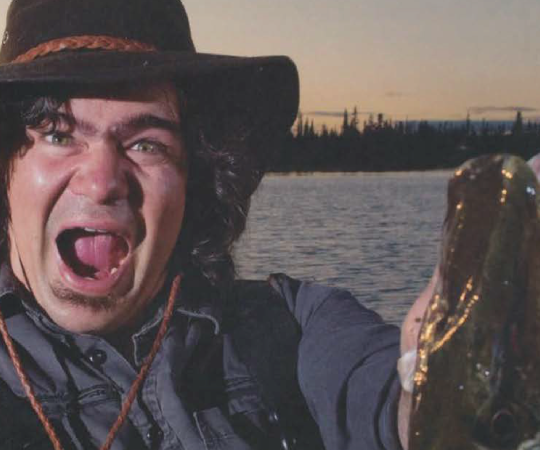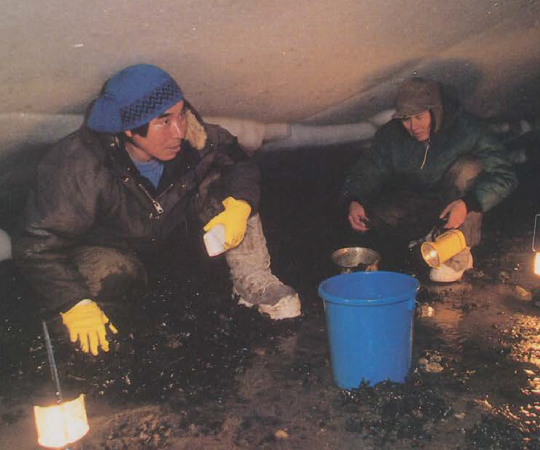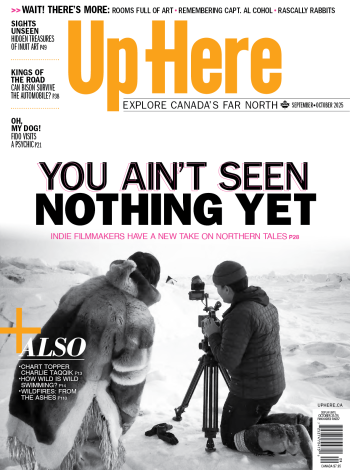It is a Sunday afternoon in early November and Francisca Mandeya has invited me into her home, in the heart of Iqaluit.
Sitting beside me, in a navy blue and white dress with her hair let down, she shares stories about her life in Zimbabwe and then leaving for Nunavut’s capital city—and the home of the Inuit—eight years ago.
Tomorrow, she will participate in a ceremony with the federal government to become a Canadian citizen, after resettling in the North and fighting for a good life—and for racial and gender equality and harmony. Now, Mandeya is challenging what it means to be a Northerner.
Mandeya was born into a family of 10 in 1970s Rhodesia, now Zimbabwe. The third daughter in the family, her traditional name—Ndaiziweyi—translates to “Had I known?” in English. She was given the name because Zimbabwean families, including her own, often prayed for sons.
“It was being born…in a succession of girls and coming out knowing that you are not wanted or you're not really welcome because they were expecting a boy,” Mandeya says. “If you didn’t have a boy yet, the family name would not go on and boys were better valued than girls. I grew up in that society.”
For Mandeya, her traditional name was a reminder she had been “born into that energy of ‘you're not enough’” as a child. She understands now that her mother experienced postpartum depression at the time. The condition wasn’t talked about, but Mandeya believes it played a role in the traditional name she was given.
Mandeya faced other hurdles growing up in a country still experiencing the deep-rooted effects of colonization and racism. “As a girl and an African, there were clear racial lines,” she says. “Whites were number one. Asians were number two. Coloureds, which is a mix between Black and white, were number three. Then it was us at the bottom, even though it was our land.”
One of Mandeya’s earliest memories of racism and sexism was when a boy in her primary school beat her because he didn’t think a girl could be smarter than him. She persisted, fighting back and defeating the boy in academics and the physical fight he started.
Mandeya says she knew then something was wrong about the society she was born into and being raised in. “When you look back, you're like, who teaches the nine-year-old boy that when girls [are smarter than you in class], you retaliate with violence or you subdue them using violence?”
It took her years to actively fight racism and sexism in Zimbabwe. She says she first began to think maybe things should be different when she lost her parents. In an unhappy marriage at the time, Mandeya was a young mother to two daughters and, later, a son. “When I became a mother, I said my girls are not going to feel the way I felt,” she says. “For me, pain was the teacher. My girls were going to be empowered and raised as equals.”
Soon, she moved to activism and advocacy work geared towards women’s rights and racial equality in Zimbabwe. But local politics were shifting and she saw her friends and colleagues getting arrested for their work in justice. Mandeya herself had been harassed and threatened by the country’s Central Intelligence Organization. It was then that her sister Tina Nleya, who was based in Nunavut, told her to move.
“She said, ‘I’m going to buy you a ticket and you’re going to come to Canada. You already have enough stories to justify why you shouldn’t be in the country.’”
Mandeya was torn about leaving Zimbabwe. Her roots were there and leaving home would mean leaving behind her kids—the fuel for her work, the people who inspired her to continue advocating for equality.
“I did not want to leave my country,” she says. “I wanted to be a patriot and toughen up there and fight for social justice as I've always been doing.” Eventually, though, the risks simply outweighed the rewards. “There came a time when it really was a question of life or death for me,” she says bluntly.
Mandeya resettled in Iqaluit in 2014. Bracing the cold of the North, moving to the Inuit homeland, she embraced a new beginning.
Except she found that even in Iqaluit—some 12,000 kilometres from Zimbabwe—racial and gender equality were a challenge. “What was striking for me was that you come to Canada and you're like, ‘Oh, life is going to be better.’ And, of course for me, it's better,” Mandeya says. “I have a job, I have a roof over my head, I feel safe for the most part, and I'm really grateful that I could come and be in a better position economically than I was at home. But just to see the level of social strife and see a little Zimbabwe in Nunavut—we have the same struggles. We are struggling with violence against women. There is poverty and people not able to put food on the table.”
“That was not my idea of Canada," she says. “It doesn't matter where you are: the challenges that women and people of colour face are almost the same across cultures, across continents.”
Mandeya jumped right into challenging inequality in Iqaluit—and Nunavut—focusing on work to improve mental health. Having completed suicide prevention training, she began hosting workshops as a certified solutions-focusedand mental fitness coach, positive intelligence coach, and transformational life coach. She has worked with people in Nunavut and across the world to help them make the shift to self-care and positive leadership within their professional organizations and institutions, their communities, and personal lives.

Mandeya has also written and published two books exploring and addressing racial and gender inequality in Canada. In Mother Behold Thy Son, she shares her own journey as a mother pushing for a more equal world for her children. She writes about how mothers can use their knowledge and power within their families to address toxic masculinity and challenge the patriarchal notions kids come across in spaces outside their homes.
In her second book—Searching for Racial Equality—Mandeya shares much of her story from Zimbabwe to Canada, making the call for racial justice through anti-racist action and collaboration.
Mandeya shared excerpts from both while playing the mbira—a traditional musical instrument banned in colonized nations across Africa not long ago—as part of Nunavut’s first Emancipation festival in September 2022.
Thumbing the instrument and sharing her story, Mandeya spoke about celebrating emancipation and made a larger call for celebrating identity by pushing for racial and gender justice. "If you want your history to be known, write it yourself,” she said at the festival.
Despite her background and active participation in local initiatives in the African and migrant community in Nunavut, Mandeya doesn’t identify herself as ‘Black.’ “I struggle with Blackness even though Blackness is a label that people are comfortable giving to people like us for whatever reason,” she says. She raises her palm to show the colour of her skin.
“I am brown—that's my true colour,” Mandeya says.
She also struggles with 'Black’ as a label because, ultimately, it establishes a binary—not necessarily giving people like her the space to embrace their African identity while also wearing many more hats within their communities.
“It's the black and white—it begins with the language, begins with the classifications that we put on,” she says. “We give people these names or titles or put them in boxes and tell them they belong there. I have not been a person that agrees to belong to a box.”
What then, would Mandeya like to be known for? A bridge builder.
Through her identity and her activism, Mandeya tries to build bridges—across continents, cultures, and challenges. Perhaps to be a Northerner is to do just that: to build bridges within the North and beyond.









